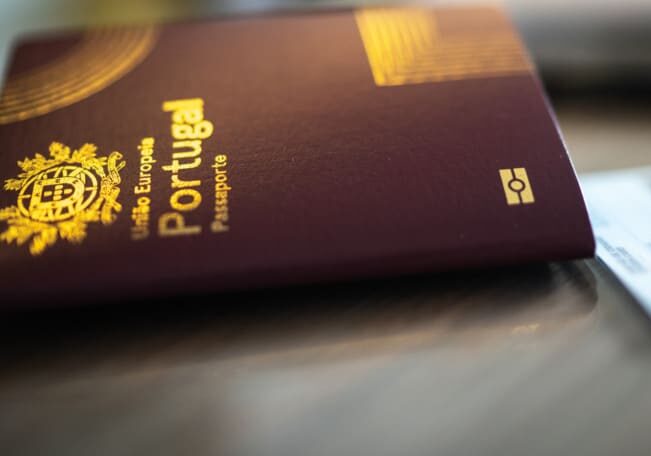Updated: July 1, 2025

Portugal is one of the most beautiful European countries, offering a high quality of life and affordable living costs in the European Union.
In addition to the leisurely Mediterranean lifestyle and delectable cuisine, there are also a number of job vacancies available for foreign nationals who speak Portuguese, English, and other European languages.
Whether you’re considering a move or already settled in this Western European gem, this comprehensive guide will provide valuable insights into the local job market, salary expectations, and work culture, helping you navigate your job search and land your dream position in Portugal.
Practical Information About Living and Working in Portugal

In 2023, Portugal ranked seventh in the Institute for Economics and Peace (IEP) Global Peace Index (GPI). This global study took into account the level of societal safety and security in the Portuguese economy and political environment.
In the sections below, we explore further information about living and working in Portugal— from the average annual salary to the cost of living in Portugal and everything in between.
The annual salary in Portugal
While Portugal’s national minimum wage of €820 per month (as of January 2024) is below the European Union average, the country’s lower cost of living means €820 stretches further than in other European countries with a higher minimum wage. Opportunities for higher salaries exist, particularly in larger or international companies and across various professions.
Full-time work typically translates to a 40-hour week, with most companies offering some flexibility in scheduling. Remember, Portugal prioritizes work-life balance, so
high-paying jobs often come with the expectation of working standard hours and enjoying ample time off.
If you live and work in Portugal, you will also need to register with the Portuguese tax system and apply for a Portuguese tax number (NIF). Our citizenship and residency partner, Global Citizen Solutions, has a guide on how to get a NIF Portugal Tax Identification Number.
Labor laws and rights in Portugal
In Portugal, the framework for labor regulations outlines a typical workweek spanning from Monday to Friday, totaling 40 working hours. Full-time employees benefit from an annual leave entitlement of 22 days, in addition to the obligatory nine public holidays. Although individual companies have the flexibility to establish their schedules, the standard workday typically commences at 9:00 and concludes at 18:30, punctuated by a one-and-a-half-hour lunch break, although this will depend on the company.
Weekends are generally designated as non-working days unless specified otherwise in the employment contract, aligning with common practice across the country. Employment contracts in Portugal encompass various forms, including permanent, fixed-term, part-time, and intermittent arrangements, mirroring prevalent structures observed across Europe.
Maternity and paternity leave
According to the Portuguese public services portal, the Portuguese labor authorities entitle workers who pay social security contributions to maternity and paternity benefits. For maternity leave, new mothers may take up to 30 days’ voluntary leave before birth and 42 days (6 weeks) of compulsory leave after birth. For paternity leave, new fathers are entitled to 28 days’ leave, taken consecutively or non-consecutively. The first 7 days must be taken consecutively and immediately after birth, while the remaining 21 days must be taken within 6 weeks (42 days) of the birth. You can find out more through the Portuguese social security office (SEG).
Notice periods in Portugal are contingent upon the duration of service, with minimum periods set as follows: 15 days for employees with less than one year of service, 30 days for employees with 1-5 years of service, 60 days for employees with 5-10 years of service, and 75 days for employees with over 10 years of service.
Exploring Social Security Benefits in Portugal

Foreign workers who are legally residing in Portugal can get a social security number, which unlocks the gateway to a multitude of benefits that can provide financial support.
This section will delve into the intricacies of the Portuguese Social Security Number (NISS), and how it empowers foreign workers who pay tax in Portugal with access to free healthcare, unemployment support, and other valuable advantages they would receive in their own country.
What is the Social Security number in Portugal?
The Número de Identificação de Segurança Social, or NISS for short, is a unique 11-digit social security number issued by the Portuguese social security system. This vital number serves as your identification for both employment and unlocking a number of social security benefits offered by the Portuguese government.
As a Portuguese taxpayer, based on your social security contributions, you are entitled to support in various situations, including unemployment, work-related injuries or illnesses, general sickness, and even retirement through an old-age pension. Additionally, the NISS safeguards you during maternity and paternity leave, offers aid in case of disability, and provides support to your loved ones in the event of your passing.
How to get a Social Security number in Portugal
Obtaining your NISS depends on your employment status. Portuguese companies are required to register their employees with social security at the start of a work contract. They’ll handle the notification process, needing your visa as proof of legal residency. You’ll likely be asked to sign a pre-filled social security form, and once the contract is submitted, your NISS will be issued.
Self-employed expats working in Portugal are responsible for applying directly at their local social security office. Gather the necessary documents and the correct application form to ensure a smooth registration process. Keep in mind that Portugal doesn’t provide physical social security cards for expats. Instead, upon successful registration, you’ll receive an official document with your NISS clearly stated.
Required documents to register for Portuguese Social Security as a self-employed foreign worker
Obtaining your NISS as a self-employed expat requires a straightforward registration process at your local Social Security office. To ensure a smooth experience, gather the necessary documents beforehand. Here’s what you’ll need:
- RV1000-DGSS form: This is the official application form for social security registration. You can download it from the Portuguese social security website or obtain one directly from the office
- ID from your country of origin: Your valid passport or national identification card serves as proof of your identity
- Portuguese tax number: This unique identifier links you to the Portuguese tax system
- (For non-EU citizens only):
- Passport: Your current passport verifies your nationality
- Residence permit (Título de Residência): This document confirms your legal residency status in Portugal
Once registered with your NISS, you’ll unlock online access to manage your social security contributions and benefits through the Segurança Social Direta platform.
Work culture in Portugal

In Portugal, hierarchy is respected within the Portuguese labor market. However, a collaborative approach where open communication and exchange of ideas is valued. Despite the relaxed vibe, punctuality is still expected, particularly when first starting a new position.
Building trust and strong working relationships are important aspects of Portuguese business culture. These connections can be created and maintained through socializing with colleagues outside of work, like lunches or team outings.
Working days and hours
The framework for labor regulations in Portugal outlines a typical workweek running from Monday to Friday, accumulating a total of 40 working hours. Employees working full-time are entitled to an annual leave allowance of 22 days on top of a mandatory nine public holidays. While Portuguese companies can establish their own working hours, the standard workday generally commences at 9:00 am. It concludes by 6:30 pm, segmented by a lunch break that lasts one and a half hours.
Portuguese workplace dress code
The dress code varies depending on the company culture. Many companies in Portugal have adopted a business casual look, prioritizing comfort and professionalism. However, it’s always advisable to familiarize yourself with the company’s specific policies to ensure you’re adhering to their expectations or formal dress code. Startups, for instance, tend to embrace a more relaxed dress code, while established businesses, particularly consultancies, may necessitate more formal attire.
Cost of living in Portugal

However, it is important to remember that the cost of living solely depends on your lifestyle, whether you have a stable job and income, and your expenditures. According to Numbeo, the minimum salary per month after taxes is about €1,061.78. However, this varies based on professional qualifications and the type of employment you have.
Excluding rent, the cost of living in Portugal for a single person is about €1,200 a month in major cities like Porto and Lisbon and even less in smaller towns. When it comes to renting an apartment in Portugal, outside the city center of the Portuguese capital of Lisbon, a one-bedroom flat will cost around €727.37 a month. Overall, by managing your living expenses and budget for essentials at the lowest cost, you can live a comfortable quality life in Portugal.
Most in-demand jobs in Portugal
Portugal’s job market features a diverse range of opportunities. The tourism industry, hospitality, and tech jobs are the most prominent sectors, especially for expats seeking English-speaking jobs in Portugal. From fast-paced call centers to luxurious resorts and charming hotels, these industries offer a plethora of positions for customer service representatives, retail associates, and hospitality staff.
However, the nation’s burgeoning tech sector is creating a surge in demand for IT and digital marketing professionals, particularly web developers in thriving tech hubs like Lisbon, Porto, and Braga. Strong communication skills are highly valued across various sectors, and alongside IT professionals, healthcare workers consistently rank among the most sought-after in Portugal.
Requirements and Eligibility for Working in Portugal As an Expat
To work in Portugal, a non-EU citizen must meet other requirements besides having the right academic qualifications for the job. In the sections below, we will discuss the eligibility requirements for expats interested in job vacancies in the country.
Do I need to speak Portuguese to get a job in Portugal?
While speaking Portuguese will definitely boost your application, it’s not mandatory to land a job in Portugal. The tourism and hospitality industries actively seek English speakers, and there are opportunities for professionals with other European languages as well. From customer service agents to technical support advisors, you can find English-speaking positions in both Portuguese and multinational companies. If you’re interested in picking up Portuguese, there are private language schools available to help you improve your Portuguese language skills.
Do I need a visa to work in Portugal?

The length of your stay and your specific job will determine the type of visa needed (temporary or long-term). The Portuguese government offers various visa programs like the Portugal D3 Visa, Portugal Digital Nomad Visa, and Portugal Golden Visa, which you can apply for through your local Portuguese Embassy.
The process can be intricate, so ensure you understand each step for a smoother experience. Once you arrive with your visa, don’t forget to apply for a residence permit within three months. Bring your passport, employment contract, and proof of health insurance for this application.
Below, we share a bit more detail about work visa programs you can apply for if you are interested in working in Portugal as an expat.
Portugal Digital Nomad Visa
In October 2022 the Portuguese government launched the Portugal Digital Nomad Visa which offers expats interested in working in Portugal the options of a temporary stay visa valid for up to a year, or a residency permit that can be extended for up to five years. This provides a chance for remote workers earning at least $3,350 (€3,040) per month to live and work in Portugal. Discover more in our Portugal Digital Nomad Visa guide if you’re interested in this visa program.
Portugal D1 Visa
The Portugal D1 Visa is a work visa that caters to individuals who have secured a job offer in the country. However, the position that you have been granted the work visa for must have been advertised publicly, gone through interviews, and remained unfilled by Portuguese or EU/EEA nationals. The D1 Visa grants you a temporary residency permit valid for two years, with the chance to extend it for another three. This work visa also paves the way for family reunification, allowing you to bring loved ones closer. After five years you could be eligible to apply for permanent residency and Portuguese citizenship.
D3 Visa (Highly Skilled Worker)
The D3 Visa, also known as the Highly Skilled Worker Visa, is a residency and work visa that targets skilled workers who have more than an undergraduate degree and are seeking employment opportunities in Portugal that leverage their expertise. Doctors, researchers, professors, and even Ph.D. students conducting research in Portugal are all prime candidates for this visa program.
Furthermore, qualifying D3 visa holders can extend their opportunities by applying for the European Blue Card scheme. This program offers skilled workers similar benefits to the D3 visa, including Portuguese residency, but with the added advantage of potentially working in the public and private sector across many European Union countries.
Portugal Job Seeker Visa
Expats with their sights set on working in Portugal but haven’t yet secured a specific job offer yet can apply for a Portugal Job Seeker Visa. This work visa grants you a window of a maximum duration of 120 days to live in Portugal and actively search for employment. It’s a single-entry visa, but a 60-day extension is possible if your job hunt takes longer than anticipated. Be prepared to demonstrate during your job search.
The application process involves the standard visa paperwork – application form, photos, passport, proof of residency elsewhere, travel insurance, private health insurance, proof of financial stability, criminal background check, and a return flight confirmation. When applying keep in mind that a pre-submitted declaration of interest to the Portuguese Institute of Employment and Vocational Training (IEFP) will go a long way in securing a job.
You can discover more about getting a Portugal work visa for expats from our migration and residency partner, Global Citizen Solutions.
How to Apply for a Job in Portugal
Whether you are looking for an English-speaking job in Portugal, seasonal work, or a more stable job, the process of finding a job in Portugal is generally straightforward. In the sections below, we will share a few ways you can find jobs in Portugal and tips to help you keep your CV and cover letter filled with up-to-date information.
Where to look for a job in Portugal
Entering the job market in any country requires some effort. To help you along the journey, we explore a few places you can start your search for jobs in Portugal below.
Job websites in Portugal
While American and other non-EU citizens utilize familiar platforms like LinkedIn, Glassdoor, and Indeed to begin their Portuguese job search, venturing beyond these general platforms can be beneficial.
Public job websites in Portugal offer a wealth of opportunities specifically targeted for the Portuguese market. The Instituto do Emprego, Portugal’s Public Employment Service, serves as a one-stop shop for job seekers, providing not only an extensive job board but also valuable resources and guidance.
Additionally, for those seeking opportunities that extend beyond Portugal’s borders, EURES, the European Job Mobility Portal supported by the European Union’s public employment services, connects job seekers with vacancies across the European Union, leveraging a network built specifically for facilitating employment within the EU.
Embassies and foreign organizations
Embassies and foreign organizations can also be very helpful in your search for jobs in Portugal. While they may not be the most abundant source of listings, their occasional postings can be highly valuable. Check the career sections of your local embassy’s website for these opportunities.
Recruitment agencies
Recruitment agencies can be a powerful asset for Americans seeking jobs in Portugal. These agencies act as a bridge between job seekers and potential employers, specializing in talent acquisition across diverse industries. Many well-established agencies operate in Portugal, including Michael Page, Hays, Randstad, and Adecco.
Additionally, temporary employment agencies can provide flexible job opportunities or a temporary job that might suit individuals looking for short-term or project-based work. To maximize your chances of success, research and target agencies that align with your field or desired position. Remember, while recruitment agencies are a valuable tool, a comprehensive job search should also encompass online job boards and direct applications to companies you’re interested in.
Tips for compiling your CV
While most Portuguese people traditionally structure their CVs with three sections (personal and contact details, professional experience, and qualifications), We advise you to showcase your unique skillset because there is flexibility when it comes to the right format to compile your CV. Here are some key points to consider when crafting your CV for the Portuguese job market:
- Keep it concise: Aim for a one-page CV highlighting your qualifications for the specific role. Two pages are acceptable for highly technical positions requiring more detail
- Personal details: Include your name, nationality, date of birth, and city of residence. Attaching a professional headshot is common practice, though optional. Include contact details and links to professional websites (if applicable)
- Highlight experience: Start with your most recent position and list your key duties and accomplishments
- Education and qualifications: List your educational background in reverse chronological order, starting with the most recent degree or course
- Skills and hobbies: You can include relevant hard and soft skills, as well as hobbies that demonstrate transferable skills
- Language: If you don’t speak Portuguese or the language required for the job, submit your CV in English
Tips for your first interview
To truly stand out in the Portuguese job market, meticulous preparation for your interview is key. Here’s a breakdown of some essential tips to ensure you make a lasting impression:
- Research the company culture: The dress code can vary depending on the company. While a slightly formal approach is always safe, research the company’s culture beforehand. Startups might favor a more relaxed look, while consultancies might require a suit.
- Craft a compelling cover letter: Though not always mandatory, a cover letter can be a powerful tool. Use it to showcase your relevant experience and highlight why you’d be a perfect fit for the role and the company.
- Highlight required qualifications: Carefully review the job offer to identify any required references or qualifications. While not always necessary, some recruiters will request them.
- Prepare for proof of qualifications (later stages): Although proof of qualifications might not be needed initially, be prepared to present them if you progress further in the application process.
Networking tips to find a job in Portugal
Networking can be a game-changer in your Portuguese job hunt, especially in bustling cities like Lisbon and Porto. These hubs host numerous networking events, offering a relaxed environment to connect with potential employers. You’re likely to encounter individuals who share your interests or expertise within your field, creating valuable connections that could lead to your dream job.
Self-Employment in Portugal

There are various ways to be self-employed in Portugal, and the initial hurdle you’ll face is determining the most suitable business structure for your needs. In Portugal, companies are generally classified into two categories based on the number of employees:
- Pessoa Singular: This refers to businesses with a single employee, which is ideal for most freelancers or solopreneurs.
- Pessoa Colectiva: This category applies to companies with more than one employee.
In the sections below, we explore more aspects of working in Portugal as a self-employed expat.
Working as a freelancer or sole trader in Portugal
Freelancing or becoming a sole trader in Portugal offers a path to business ownership with some key considerations. Before any work commences, registering your business with the tax authority, Finanças, is mandatory. Freelancers can often benefit from a simplified tax regime for businesses with a turnover below €200,000, potentially reducing administrative burdens.
When it comes to choosing a business structure, the empresario em nome individual offers a straightforward setup, but remember, your personal assets are on the line for any debts incurred. If limiting your personal liability is a priority, a unipessoal limitada creates a clear separation but comes with a €5,000 minimum investment and may sacrifice some tax advantages.
Owning a company in Portugal
Portugal offers a variety of legal structures for companies with employees, catering to different needs. From the widely used Sociedade por Quotas (Private Limited Company) to the Sociedade Anónima (Public Limited Company), each structure presents its own advantages. Choosing the right one can be daunting, so the first step is to visit the Finanças (Tax Office).
However, for a smooth setup and ongoing tax management, consulting with an experienced accountant is highly recommended. Their expertise can ensure you navigate the complexities of Portuguese business structures and taxation, maximizing your company’s potential.
Top self-employed jobs in Portugal for expats
The world of freelance work in Portugal is welcoming to expats with a variety of sought-after skills who are in search of English-speaking jobs and jobs that require you to speak other languages. If you excel in fields like accounting, design, marketing, development, consulting, or writing, you can leverage your expertise to establish a successful freelance business.
Portugal’s tourism industry, a cornerstone of its economy, also presents excellent opportunities for expat entrepreneurs. With tourist numbers steadily rising, this sector offers a promising avenue for those looking to start a tourism-related business, such as language instruction, guided tours, or even a travel blog or consultancy.
The best Portuguese cities for expats to live
Portugal is full of incredible cities with a diverse range of lifestyles and attractions, international and language schools, and expat communities filled with like-minded English speakers with whom to possibly make connections. Below, we have created a short list of the best cities for living as an expat in Portugal.
Lisbon
Lisbon, the Portuguese capital, is definitely one of the best cities for expats to live in and is even home to Portugal’s largest expat population. Lisbon is a vibrant city known for its incredible architecture, excellent international schools, and easy access to top-quality amenities like hospitals and banks. You will also find some of Portugal’s most stunning beaches along the Lisbon coast, such as Carcavelos and Costa da Caparica, to the south of Lisbon. These attractive offerings do make Lisbon a more expensive city to live in compared to other cities in Portugal. Still, it is possible to find good property deals when looking to relocate to this city.
Porto
Porto, Portugal’s second-largest city, is a top choice for expats seeking an authentic Portuguese lifestyle. Nestled along the Douro River, this UNESCO World Heritage Site boasts stunning architecture, delicious gastronomy, and famous Port wine. Known for its start-up culture and affordability compared to Lisbon, Porto offers diverse housing options and vibrant neighborhoods like Boavista and Foz do Douro.
Faro
Faro, the Algarve’s main city, offers expats an unbeatable combination of exceptional weather, stunning beaches, and a laidback lifestyle. Known for its vibrant expat community and affordable real estate market, Faro provides lower rental and housing costs than Lisbon, Lagos, and Albufeira. With excellent transportation links and an international airport, Faro is a top choice for expats.
Viseu
Viseu, a medieval gem in central Portugal, ranks among the best cities for expats. Known for its superb quality of life, efficient public transport, and excellent education and healthcare, Viseu offers affordable real estate and a growing job market. Surrounded by nature and rich in Renaissance architecture, Viseu provides a peaceful, culturally rich lifestyle.
Évora
Évora, the capital of the Alentejo region, is a charming and peaceful city perfect for expats. With its UNESCO World Heritage status, Évora offers a rich history, stunning medieval architecture, and iconic landmarks like the Roman Temple and Chapel of Bones. Enjoy excellent weather, friendly locals, and a relaxed lifestyle in this picturesque city.
Goldcrest: Who We Are
Goldcrest is a buyer’s agent based in Lisbon, Porto, and the Algarve. Equipped with local knowledge, exclusive networks, and international experience, we provide expert, impartial advice on real estate investments and how to buy property in Portugal. From scouting out the perfect property to property acquisition and beyond, we have you covered throughout the process.
Why choose Goldcrest?
- Local knowledge: With offices located throughout Portugal, our presence nationwide allows us to assist you personally.
- Independent service: As an independent buying agent, we do not represent any development or project. Our service is entirely tailored toward each client, providing you with everything you need to secure the perfect property at the best possible price. As an impartial advisor on the market, we work solely on behalf of our client and provide a service tailored to your needs and requirements.
- Streamlined process: Our real estate agents speak English and Portuguese, and our service is entirely focused on providing you with a hassle-free buying experience, saving you time.
- Experienced team: Our expert real estate team has a vast local knowledge of the Portuguese property market. We have cutting-edge technology and metasearch tools at your disposal to provide complete market coverage, ensuring the best investment choices and negotiated prices.
- Network of partners: Lawyers, property management services, builders, architects, designers, and landscape gardeners, again saving you time and hassle by providing you with trusted experts in their field of work.
Frequently Asked Questions About Working in Portugal
Is it easy to get a job in Portugal as a foreigner?
Even with a compelling CV, excellent communication skills, and relevant work experience, it can be fairly difficult for foreigners to find a job in Portugal. The process depends on your profession and work experience. Job listing websites, local embassy listing pages, and recruitment agencies in Portugal can assist in connecting Americans and other foreigners with job opportunities.
How can a foreigner get a job in Portugal?
A foreigner can get a job in Portugal by exploring various resources. Check job boards on listing websites, visit local embassy websites or foreign organizations like EURES, the European Job Mobility Portal, and work with recruitment agencies in Portugal. These methods can help connect you with job opportunities tailored for foreigners.
Can foreigners work in Portugal?
Foreigners can work in Portugal once they have secured a residency or work permit. To find job opportunities, they can check job boards on listing websites, visit local embassy websites, or explore resources like EURES, the European Job Mobility Portal. Additionally, recruitment agencies in Portugal can help connect foreigners with suitable job openings.
Is it hard for Americans to get a job in Portugal?
It is not necessarily hard for Americans to get a job in Portugal. To work in Portugal, Americans will need a work visa and a temporary stay visa, which depend on the length of stay and the specific job. Additionally, self-employed Americans can live and work in Portugal with the Digital Nomad Visa.
Is Portugal a good place to work?
Yes, Portugal is a great place to work. Portugal quality of life is high and the country has affordable living costs, and beautiful scenery. The leisurely Mediterranean lifestyle and delicious cuisine add to its appeal. There are also numerous job opportunities for foreign nationals who speak Portuguese, English, and other European languages.
What types of jobs are available in Portugal?
Various job opportunities are available in Portugal, particularly in sectors like IT, with demand for web developers, call center sales representatives and business support agents. The hospitality sector also offers opportunities for roles like waitstaff and bartenders. Additionally, there’s a demand for digital marketing specialists and project managers.
